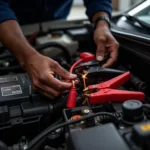Keeping your car in tip-top shape doesn’t have to be a mystery. Knowing what your car needs and when it needs it can save you money, headaches, and even prevent dangerous breakdowns. This guide will take you through everything you need to know about car servicing, so you can hit the road with confidence.
Understanding the Basics: Why Service Your Car?
Regular car servicing is like taking your car to the doctor for a check-up. It’s about preventing small issues from becoming major (and expensive) problems down the line.
Here’s why it matters:
- Safety First: Regular maintenance ensures your brakes, tires, lights, and other critical safety systems are in working order, keeping you and your passengers safe.
- Performance Boost: A well-maintained car runs more efficiently, offering better fuel economy and smoother handling.
- Extended Lifespan: Consistent servicing can significantly increase the lifespan of your vehicle, saving you money on costly replacements in the long run.
- Higher Resale Value: A car with a well-documented service history is more attractive to potential buyers, resulting in a higher resale value.
Decoding the Service Schedule: What Does it all Mean?
Most car manufacturers provide a recommended service schedule in your owner’s manual. This schedule outlines the specific maintenance tasks required at different mileage intervals.
While schedules vary, some common service intervals include:
- Every 3,000 Miles or 3 Months: This usually involves an oil change, oil filter replacement, and a general inspection of fluids, belts, and hoses.
- Every 6,000 Miles or 6 Months: In addition to the 3,000-mile service, this interval may include air filter replacement, tire rotation, and a more thorough inspection of brakes and suspension components.
- Every 12,000 Miles or 12 Months: This often involves a comprehensive inspection, spark plug replacement, and checks on the battery, exhaust system, and other crucial components.
- Major Services: These occur at higher mileage intervals (e.g., 30,000, 60,000, 90,000) and include more extensive procedures like transmission fluid flushes, coolant flushes, and timing belt replacements.
Pro Tip from John Miller, Master Mechanic: “Don’t just rely on the mileage. If you frequently drive in harsh conditions like extreme heat, cold, or dusty environments, you may need more frequent servicing.”
Beyond the Basics: Essential Car Service Components
While the service schedule provides a general guideline, understanding the individual components and their importance is crucial.
1. Fluids: The Lifeblood of Your Car
Your car relies on various fluids to function correctly, and these fluids degrade over time.
- Engine Oil: Lubricates moving parts, reduces friction, and prevents engine wear.
- Coolant: Regulates engine temperature, preventing overheating.
- Brake Fluid: Transmits hydraulic pressure to the brakes, ensuring proper stopping power.
- Transmission Fluid: Lubricates and cools the transmission, enabling smooth gear changes.
- Power Steering Fluid: Assists in turning the steering wheel.
Regularly checking and changing these fluids is vital for optimal performance and longevity.
2. Filters: Keeping Things Clean
Filters play a crucial role in removing contaminants from various systems in your car:
- Oil Filter: Traps dirt and debris from the engine oil, protecting the engine from wear.
- Air Filter: Cleans the air entering the engine, ensuring optimal combustion and fuel efficiency.
- Cabin Air Filter: Purifies the air entering the cabin, keeping the air you breathe clean and allergen-free.
Replacing filters regularly ensures these systems function efficiently and effectively.
3. Brakes: Stopping Power You Can Trust
Your brakes are arguably the most critical safety system in your car. Regular brake inspections and maintenance are essential.
- Brake Pads: Provide the friction needed to stop the car. They wear down over time and need replacement.
- Brake Rotors (or Drums): The metal discs that the brake pads clamp onto. They can become warped or worn and may need resurfacing or replacement.
- Brake Fluid: As mentioned earlier, brake fluid is crucial for transmitting hydraulic pressure.
If you notice any squeaking, grinding, or vibrations when braking, it’s crucial to have your brakes inspected immediately.
4. Tires: Your Point of Contact with the Road
Tires are responsible for your car’s grip, handling, and overall safety on the road.
- Tire Pressure: Maintaining correct tire pressure ensures optimal contact with the road, improving fuel efficiency and handling.
- Tire Rotation: Rotating your tires regularly ensures even wear and extends their lifespan.
- Wheel Alignment: Proper wheel alignment prevents uneven tire wear and improves handling.
Regularly inspecting your tires for wear and tear, bulges, or punctures is crucial.
5. Belts and Hoses: Connecting the Vital Parts
Belts and hoses connect various engine components and ensure they function in sync.
- Timing Belt (or Chain): Controls the timing of the engine’s valves. A broken timing belt can result in catastrophic engine damage.
- Serpentine Belt: Drives various engine accessories, including the alternator, power steering pump, and air conditioning compressor.
- Hoses: Carry fluids like coolant and power steering fluid throughout the engine.
Inspecting belts and hoses for cracks, fraying, or leaks is essential.
Listening to Your Car: Common Warning Signs
Your car often provides clues when something needs attention. Pay attention to these warning signs:
- Dashboard Warning Lights: Don’t ignore illuminated warning lights on your dashboard. They indicate potential issues that need to be addressed.
- Unusual Noises: Squeaking, grinding, knocking, or other unusual noises from your car often indicate a problem.
- Fluid Leaks: Puddles of fluid under your car can indicate a leak. Check the color and consistency of the fluid to determine the source.
- Changes in Performance: Sudden decreases in fuel efficiency, acceleration, or strange handling can all be signs of underlying issues.
Pro Tip from John Miller, Master Mechanic: “Regularly checking your car’s fluids yourself is a simple yet powerful way to catch potential problems early. Learn how to check your oil, coolant, and brake fluid levels – it only takes a few minutes.”
Choosing the Right Car Service Provider
Finding a trustworthy and reliable car service provider is essential.
- Dealerships: Offer specialized knowledge of your car’s make and model but can be more expensive.
- Independent Mechanics: Often more affordable than dealerships and may offer more personalized service.
- Chain Repair Shops: Provide convenient, standardized service, but quality can vary.
Consider factors like experience, reputation, certifications, and customer reviews when making your choice.
Conclusion: Car Servicing for Peace of Mind
Understanding the basics of car servicing empowers you to make informed decisions about your vehicle’s maintenance. By following the recommended service schedule, being aware of common warning signs, and choosing a trustworthy service provider, you can ensure your car runs smoothly, safely, and reliably for years to come. Regular maintenance is an investment that pays off in the long run, providing you with peace of mind every time you hit the road.
FAQs About Car Servicing
1. How often should I change my car’s oil?
While it depends on your car and driving conditions, the general rule is every 3,000 miles or 3 months. Always refer to your owner’s manual for specific recommendations.
2. What happens if I skip a service?
Skipping a service can lead to a buildup of sludge and debris in your engine, reduce fuel efficiency, and increase the risk of breakdowns and costly repairs in the future.
3. Can I service my car myself?
While some routine tasks like checking fluids and changing air filters can be done at home, it’s best to leave more complex procedures to qualified professionals.
4. How do I know if a mechanic is trustworthy?
Look for certifications (ASE certification is a good indicator), read online reviews, and ask for recommendations from friends or family.
5. How much does car servicing cost?
The cost varies depending on the type of service, your car’s make and model, and the service provider you choose.
For more information about car servicing and related topics, check out these resources:
- What is foster care with services indiana?
- How to access home care services
- What services do respite care provide
Need assistance with your car service? Contact us via WhatsApp: +1(641)206-8880 or Email: [email protected]. Our 24/7 customer support team is here to help!



